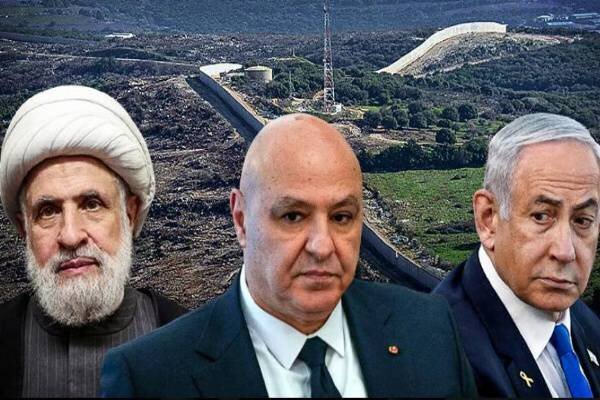Fragile Ceasefire: Is a New Wave of Heavy Israeli Attacks on Lebanon Imminent?

webangah News Agency,International Desk: One year after the cessation of Lebanon’s Third war,the country’s political landscape has become a stage for a high-stakes diplomatic confrontation. The ceasefire agreement, initially designed to stabilize peace, has effectively turned into the frontline of a complex battle over wills and strategic objectives. On one side stands the US-Israeli axis demanding complete disarmament of Hezbollah as an unequivocal condition-deemed “non-negotiable” and the only way to prevent another devastating war.
Hezbollah insists that its weapons are not a threat but Lebanon’s guarantee for survival and its sole effective deterrent against external dangers. The group firmly refuses disarmament. This direct standoff has produced a state of suspension in Lebanon, severely undermining national stability. Experts argue that efforts by US envoys ortega and Barak to control Beirut’s political decisions have contributed considerably to this precarious situation. This report aims to explore the key dimensions underpinning this conflict between Lebanon and Israel.
The escalating tensions and instability in southern Lebanon stem from two undeniable realities: Israel’s continued occupation of five strategic positions on Lebanese soil and near-daily blatant violations of the ceasefire agreement meant to preserve regional calm. These persistent breaches have normalized border conflicts, creating an unpredictable atmosphere fraught with constant risk of escalation.
The deadly consequences extend beyond military clashes, directly impacting civilians’ lives. A tragic illustration occurred last Monday in Al-Biyad village in Tire district-a grim reminder within an ongoing pattern that includes provocative attacks targeting UN peacekeepers (UNIFIL). Such actions highlight dangerously intensifying hostilities along with outright disregard for international law and human lives in the region.
Choosing Between Fragile Peace or Full-Scale War
Amidst fear and deep mistrust, diplomatic efforts aimed at averting full collapse of peace in Lebanon have reached a critical point. The imminent visits by Morgan Ortagus-Trump’s special envoy-to Beirut; Yazid bin Farhan, Saudi Arabia’s advisor on Lebanese affairs; along with Hassan Rashad from Egypt’s intelligence apparatus symbolize this fragile diplomacy walking on a razor’s edge.
the core issue is implementing one of November 2024’s most contentious ceasefire clauses: Hezbollah’s disarmament alongside exclusive deployment by Lebanese Army forces and UNIFIL across southern Lebanon. Washington’s stern warnings make clear that without decisive action from Beirut, new military confrontation with Israel is unavoidable. despite mounting diplomatic pressure, hezbollah remains resolute in rejecting any disarmament proposal while declaring readiness to defend itself-heightening complexity further.
This political deadlock coincides with intensified military attacks placing President Aoun-Salam government at perilous crossroads: either succumb to international demands risking internal strife or resist facing another possibly broader destructive war than before. Realistically, if technocrats governing today took sober note of battlefield realities they would recognize Hezbollah disarmament as infeasible-and avoid falling into civil conflict traps.
Repeated Ceasefire Violations Signal Imminent New War
The fragile November 2024 truce exists more on paper than reality; it is indeed steadily eroded amid explosions and smoke caused by Israeli airstrikes across southern and eastern Lebanon. These operations purportedly target Hezbollah infrastructure members aiming to halt rebuilding their military capabilities yet have become routine-claiming over thirteen lives within days-including two civilian brothers at a woodworking factory plus senior Hezbollah commanders.
This violent spiral further engulfs UN peacekeepers (UNIFIL). Recent incidents highlighted global alarm: aggressive Israeli drone flights overhead; warning tank shots fired; grenade thrown near UNIFIL vessels-all triggering harsh condemnations from both United Nations officials who labeled these acts “extremely dangerous” and also French diplomats concerned about escalating threats toward these international forces tasked with maintaining regional stability-which itself now appears jeopardized further amid such developments.
A Bleak Reality
Ultimately,Lebanon epitomizes painful paradoxes under blatant double standards: while one party commits daily ceasefire violations freely occupying Lebanese lands spilling civilian blood-with impunity-the global community points finger mainly at those fighting solely for survival without ambitions beyond self-defense.
Calls for resistance disarmament amount merely to attempts stripping away Lebanon’s single shield against aggressors.
Meanwhile Western powers deliberately overlook daily Israeli offenses expecting Beirut leaders ultimately bow down relinquishing fundamental rights.
This scenario does not represent genuine peace but harsh diktats where calm comes at unbearable costs-submission bordering perpetual vulnerability.
Lebanon now struggles through imposed choices confronting surrender or destruction-not selecting but enduring last chapters chronicled injustices.
In recent months Sheikh Naim Qassem has demonstrated wise leadership refusing involvement in security provocations initiated by Israel while focusing exclusively on repairing military-security fractures inflicted during ongoing crises.


